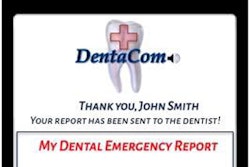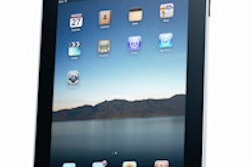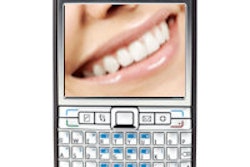
The numbers don't lie -- mobile health is thriving. At a time when more adults than ever before use their smartphones to get health information, why are many dentists still not incorporating apps in their practice?
According to a 2015 Pew research report, almost two-thirds of Americans own a smartphone, up from about one-third in 2011. The report also found 62% of people used their smartphone as an access point to get information about a health condition.
 Ben Underwood, BChD, U.K.-based dentist, researcher, and app developer who created Brush DJ.
Ben Underwood, BChD, U.K.-based dentist, researcher, and app developer who created Brush DJ.These statistics imply that apps may be a novel tool to educate and interact with patients. With this in mind, DrBicuspid.com spoke with Carolyn Bradner Jasik, MD, and U.K.-based dentist Ben Underwood, BChD, two digital health stakeholders to explain how mobile applications can transform your practice.
Dr. Bradner Jasik is the vice president of medical outcomes for Mango Health, an app helps patients manage their medications and build healthy habits. Underwood is a dentist, researcher, and app developer who created Brush DJ, an app that times toothbrushing using two minutes of music taken from the user's device.
Educate patients and obtain data
According to the Pew report, 30% of smartphone users use their phone for educational purposes, so at least some patients may be open to an app that teaches them about oral health. Certain apps are created specifically for this purpose, while others, including Brush DJ, feature evidence-based oral health information in addition to other features.
 The Brush DJ app is free to download from the iTunes App and Google Play stores.
The Brush DJ app is free to download from the iTunes App and Google Play stores."If the patient walks into the surgery holding a mobile phone ... and on examination has less than ideal oral hygiene, then giving them information about the app would seem like a no-brainer," Underwood said. "Because the app is free, even if the patient does not use it, they have not lost anything."
While some apps focus exclusively on oral health, many others approach wellness holistically. Dental providers can reference general health applications to gather additional information about their patient's overall wellness to provide the best care possible. Dr. Bradner Jasik noted that medication adherence apps, such as Mango Health, could be of particular benefit for dental professionals, because patients often forget or do not think to mention supplements, nondental conditions, or over-the-counter medications.
Reach younger patients
While Americans in general are moving toward using smartphones for health-related purposes, that trend is greater for young adults. The Pew report found more than three-quarters of 18- to 29-year-olds used their smartphones to get health information -- that's 15% more than their older counterparts. Nearly 45% are also consuming educational content with their smartphones.
"Young adults incorporate mobile devices into a host of information seeking at a higher level than older users," the report noted, making mobile applications seem like a great launching place to better connect with younger patients.
Solve problems
“Technology offers an opportunity to really flatten some of these silos that exist. ... That's why I'm excited about mobile health. It offers an opportunity for us to work a lot more together.”
Apps can also serve as problem-solving tools, and Dr. Bradner Jasik, a pediatrician, uses Mango Health for that purpose within her own practice. She explained that she used the medication adherence app to find out when one patient was having trouble remembering to take her newly prescribed birth control pills.
"I said to her, 'The reason I want you to do this is because I want us to be able to look at this together when you come back in a month,' " she said. "So having that information facilitates more of conversation than just how come you're not taking your meds."
Show you care
Both Underwood and Dr. Bradner Jasik echoed that dental professionals send a signal to patients that they really care when they suggest something above and beyond typical recommendations. App suggestions may provide a positive outcome for patients, and they can also differentiate a practice and serve as a customer service standpoint.
"Every dental health professional wants their patients to have a healthy mouth," Underwood said. "Anything that helps our patients to achieve this is useful, especially if it is free."
Help your bottom line
Mobile apps may even have the ability to help your practice thrive financially. Brush DJ and similar apps feature alerts that remind patients to get their regular dental checkup, which can have a direct impact for the practice.
However, mobile apps can have other, less visible ways of helping the practice's bottom line. For example, some can help patients stick with their prescribed medication and post-treatment plans, which can help cut back on appointments for complications.
"If people are at home, taking their medication and being adherent, that frees up time to schedule or book other patients," Dr. Bradner Jasik said.
Similarly, apps can make mundane oral health tasks, such as toothbrushing, more engaging for users, helping to prevent future decay and complications for dentists, according to Underwood. He also suggested that working with patients to find an ideal app for them can help a practice reap in other positive consequences.
"If a patient comes to a practice that is forward-thinking, innovative, and wants to help them prevent dental disease rather than just treat the consequences, they are more likely to come back and tell their friend how good the practice is," he said. "This can only be good for the bottom line."
Improve overall health
While healthcare professions are often divided, many patients view their health holistically, and apps provide an opportunity for all providers to look at health more holistically, Dr. Bradner Jasik noted. She hopes that dental health professionals will take a look at various mobile apps, not just those directly related to oral health, and evaluate whether they can be incorporated in a meaningful way into their practice.
"We have such silos in healthcare, but patients think of their health comprehensively," she said. "Technology offers an opportunity to really transcend some of these silos. ... That's why I'm excited about mobile health. It offers an opportunity for us to work a lot more together."
For more information about Mango Health or to reach Dr. Bradner Jasik, email [email protected]. For more information about Brush DJ or to help Underwood with National Health Service fellowship research about barriers to innovation, please visit www.brushdj.com.



















